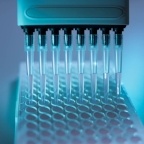- Other Products
- CCP
CD20 is a protein expressed on the surface of B-cells from an early phase of development until cell maturity. Although the physiological ligand and exact biological function of CD20 is still unknown, it is believed to act as a calcium ion channel in the cell membrane. CD20 is clinically interesting as it is found on many forms of cancer, including B-cell lymphomas, lymphocytic leukemia, myeloma and thymoma.


CD20 is a protein expressed on the surface of B-cells from an early phase of development until cell maturity. Although the physiological ligand and exact biological function of CD20 is still unknown, it is believed to act as a calcium ion channel in the cell membrane. CD20 is clinically interesting as it is found on many forms of cancer, including B-cell lymphomas, lymphocytic leukemia, myeloma and thymoma.
A number of antibody-based therapeutics targeting CD20 have been approved in the treatment of B cell lymphomas and B cell-mediated autoimmune diseases. They include rituximab, ocrelizumab, obinutuzumab, ofatumumab, ibritumomab tiuxetan, tositumomab, and ublituximab.
CD20 monoclonal antibodies (mAbs) exert their anti-tumor effect through Fab- or Fc-mediated effects that involve the activation of immune effector mechanisms. They can be grouped into two groups based on their ability to induce a reorganization of CD20 molecules into lipid rafts upon binding.
However, both types of antibodies can induce antibody-dependent cell-mediated cytotoxicity (ADCC).
Like many antibody-based therapeutics, CD20 mAbs induce ADCC. Clearly, being able to accurately measure the ADCC activity of a drug candidate is essential in the development of new therapeutics. Svar offers a sensitive and specific cell-based iLite® ADCC CD20 assay which is ideal for determining the potential of an antibody targeting CD20 to elicit ADCC. This assay is ideal for identifying the mechanism of action of new therapeutic antibodies, asses immunogenicity and determine biosimilarity between a candidate drug and its originator.
The combination of cleverly engineered effector cells and homologous antigen-positive or antigen-negative target cells creates a system that offers unparalleled sensitivity for each target and is truly greater than the sum of its parts.